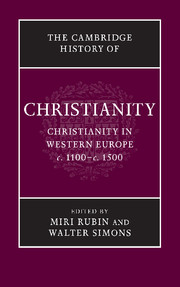Book contents
- Frontmatter
- Introduction
- PART I INSTITUTIONS AND CHANGE: 1100–1200
- PART II FORGING A CHRISTIAN WORLD, 1200–1300
- PART III THE ERECTION OF BOUNDARIES
- PART IV SHAPES OF A CHRISTIAN WORLD
- 15 Sacramental life
- 16 Religious soundscapes: liturgy and music
- 17 Images and their uses
- 18 Mary
- 19 Mysticism and transcendence
- PART V CHRISTIAN LIFE IN MOVEMENT
- PART VI THE CHALLENGES TO A CHRISTIAN SOCIETY
- PART VII REFORM AND RENEWAL
- Select bibliography
- Index
- Map 1 Western Europe c. 1100 – c. 1500
- Map 2 Universities of Europe
- References
16 - Religious soundscapes: liturgy and music
from PART IV - SHAPES OF A CHRISTIAN WORLD
Published online by Cambridge University Press: 28 March 2010
- Frontmatter
- Introduction
- PART I INSTITUTIONS AND CHANGE: 1100–1200
- PART II FORGING A CHRISTIAN WORLD, 1200–1300
- PART III THE ERECTION OF BOUNDARIES
- PART IV SHAPES OF A CHRISTIAN WORLD
- 15 Sacramental life
- 16 Religious soundscapes: liturgy and music
- 17 Images and their uses
- 18 Mary
- 19 Mysticism and transcendence
- PART V CHRISTIAN LIFE IN MOVEMENT
- PART VI THE CHALLENGES TO A CHRISTIAN SOCIETY
- PART VII REFORM AND RENEWAL
- Select bibliography
- Index
- Map 1 Western Europe c. 1100 – c. 1500
- Map 2 Universities of Europe
- References
Summary
Music played a crucial role in the world of medieval Christianity. The performance and composition of music not only reflected surrounding historical and theological contexts, but also actively determined liturgical and devotional experience. In the High and Late Middle Ages, musicians continued to cultivate the traditional genres of chant and also created new kinds of music for performance both inside and outside the liturgy. The present chapter aims to show the place of these musical trends in religious culture.
In the period 1100–1500, sacred music took on an ever-expanding range of functions and contexts, including not only the worship of the regular clergy, and those services and processions that were attended by parishioners, but also votive performances specially commissioned by lay and clerical patrons, and communal singing by associations of laypeople. Guilds and other associations were increasingly involved in the patronage and performance of religious music, and the mendicant orders’ emphasis on spiritual instruction fostered confraternities of laypeople who sang vernacular songs. The performance of the liturgy remained the cornerstone of the corporate identity of those in religious orders.
Keywords
- Type
- Chapter
- Information
- The Cambridge History of Christianity , pp. 238 - 253Publisher: Cambridge University PressPrint publication year: 2009
References
- 2
- Cited by

